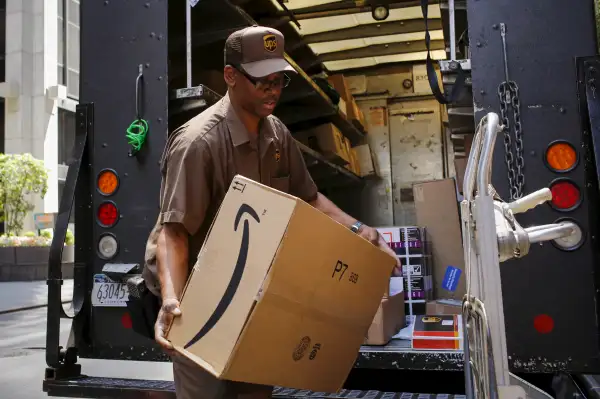How to Bet on Amazon Without Actually Buying Its Insanely Expensive Stock
Money is not a client of any investment adviser featured on this page. The information provided on this page is for educational purposes only and is not intended as investment advice. Money does not offer advisory services.

Thanks to the miracle of modern technology, all you need to do is shout to Amazon's Alexa and you'll have a case of yams at your door in two business days. But is there some way to bet on the boom in online retailing without buying Amazon stock?
It's hard to knock Amazon, which has disrupted most of retail. Despite a mid-summer slide, Amazon shares are still up more than 30% this year. The stock trades at a vertiginous 249 times its past year's operating earnings.
Other e-tailers are also in nosebleed territory: Netflix trades at a price/earnings ratio of 207; Grubhub's P/E is 80; and Alibaba clocks in at 63. You could invest in a mutual fund or ETF, such as Amplify Online Retail ETF (IBUY). But the typical P/E of such funds are similarly frothy (see chart).
Instead, consider investing in shares of the companies that deliver your Amazon or Wayfair packages. They're not glamorous, and they're not directly in retailing. Yet they offer you a less bumpy way to ride e-commerce.
"It's a tangential way to play the growth of Internet retailing," says Charles Carlson, CEO of Horizon Investment Services. After all, Alexa can do lots of things, but she can't drive a set of monkey wrenches to your home.
This is actually a timeless strategy. Investors have long believed momentum in transportation stocks is a by-product of a booming industrial sector—so why not the same for e-commerce?
Stocks such as United Parcel Service (UPS) and FedEx (FDX) are part of the online retailing explosion. Despite falling oil prices and increased orders, their shares have lagged Amazon's this year. One reason: Even though orders have increased, revenue per vehicle stop has slowed, says Matthew Moulis, manager of Fidelity Select Transportation (FSRFX). Both companies originally were mainly business-to-business companies that could pick up and deliver many packages at once. "It comes up in every conference call," Moulis says. "They're both productively addressing the issue."
As problems go, though, too much business is one of the best to have, says Jim Corridore, analyst for CFRA. "I wish all my stocks had that problem." Both outfits have spent heavily to make sure that they won't get a reputation for late holiday deliveries, which has cut into their profit margins.
Nevertheless, he's got strong buys on both UPS and FedEx. "Online sales are more than 50% of holiday sales, and they are going to be big beneficiaries of the back-to-school season—and the fact that no one wants to set foot in a mall anymore," Corridore says.
If you want to diversify your bets, go with a fund like SPDR S&P Transportation ETF (XTN) or Fidelity Select Transportation.
Amazon, clearly, is a juggernaut, and the stock has returned roughly 30% a year for the past decade vs. about 8% for the S&P 500. Online retailing is here for the long run. And transports might be a "good enough" way to ride this trend.
